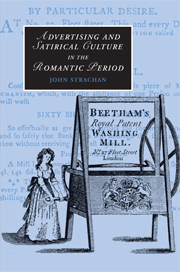Book contents
- Frontmatter
- Contents
- List of illustrations
- Acknowledgements
- Introduction
- 1 A ‘department of literature’: Advertising in the Romantic period
- 2 ‘Humbug and Co.’: Satirical engagements with advertising 1770–1840
- 3 ‘We keeps a poet’: Shoe blacking and the commercial aesthetic
- 4 ‘Publicity to a lottery is certainly necessary’: Thomas Bish and the culture of gambling
- 5 ‘Barber or perfumer’: Incomparable oils and crinicultural satire
- 6 ‘The poetry of hair-cutting’: J. R. D. Huggins, the emperor of barbers
- Conclusion: ‘Thoughts on puffs, patrons and other matters’: Commodifying the book
- Notes
- Bibliography
- Index
- CAMBRIDGE STUDIES IN ROMANTICISM
5 - ‘Barber or perfumer’: Incomparable oils and crinicultural satire
Published online by Cambridge University Press: 22 September 2009
- Frontmatter
- Contents
- List of illustrations
- Acknowledgements
- Introduction
- 1 A ‘department of literature’: Advertising in the Romantic period
- 2 ‘Humbug and Co.’: Satirical engagements with advertising 1770–1840
- 3 ‘We keeps a poet’: Shoe blacking and the commercial aesthetic
- 4 ‘Publicity to a lottery is certainly necessary’: Thomas Bish and the culture of gambling
- 5 ‘Barber or perfumer’: Incomparable oils and crinicultural satire
- 6 ‘The poetry of hair-cutting’: J. R. D. Huggins, the emperor of barbers
- Conclusion: ‘Thoughts on puffs, patrons and other matters’: Commodifying the book
- Notes
- Bibliography
- Index
- CAMBRIDGE STUDIES IN ROMANTICISM
Summary
‘Rowland! I have great faith in Rowland. Without him, I believe, there would have been many bald women committing suicide!’
George Meredith, Evan Harrington (1861)The subject of the ensuing pages is advertising by ‘perfumers’, a late Georgian term most commonly applied to barbers who had expanded their business into the manufacture and sale of products in the areas of grooming and beautification: skin lotions, toothpastes and, most importantly of all, hair oils (hair lotions, dyes and tonics were the most lucrative of the perfumers' products). They discuss the controversy regarding the best method of dressing the hair that exercised contemporary manufacturers and consumers alike: animal fat or vegetable fat, or, most particularly, bear's grease or macassar? As well as examining the promotional strategies of the perfumers, most notable of whom were Alexander Rowland and Son, they of the famed Macassar Oil, and James Atkinson, proprietor of the most well-known of all animal fat-based hair dressings, Atkinson's Bear's Grease, I also attend to various satirical works that deal with the dressing of the hair. Tonsorial, or ‘crinicultural’, satire is a fascinating sub-genre of Romantic period comic writing, and varies widely in its intent; some has clear political resonance, such as the mid-1790s political satire that greeted Pitt's introduction of a tax on hair powder (such as John Wolcot's Hair Powder: A Plaintive Epistle to Mr Pitt or the anonymous The Minister's Head Dressed According to Law, or a Word of Comfort to Hair-Dressers (both 1795), while others are less sociopolitically engaged comic treatments of the dressing of the hair (such as the Useful Advice to Hair-Dressers, Barbers & c., by John Moor (1810)).
- Type
- Chapter
- Information
- Advertising and Satirical Culture in the Romantic Period , pp. 204 - 225Publisher: Cambridge University PressPrint publication year: 2007



